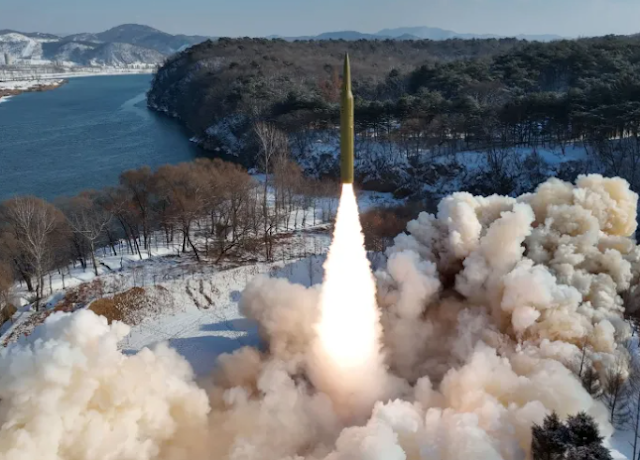North Korea Conducts Test of Hypersonic Warhead on Solid-Fuel Missile
North Korea announced on Monday that it had successfully tested a new solid-fuel missile equipped with a hypersonic warhead, as part of its ongoing efforts to develop advanced and harder-to-detect weaponry.
The launch occurred on Sun Day afternoon, coinciding with Foreign Minister Choe Son Hui's visit to Moscow. This development raised concerns in the United States and other nations about the possibility of Pyongyang selling weapons to Russia for potential use in Ukraine, in exchange for Russian technological expertise.
Detected by neighboring Japan and South Korea, the test aimed to assess the reliability of new multi-stage, high-thrust solid-fuel engines and an intermediate-range hypersonic maneuverable controlled warhead, according to the state-run Korean Central News Agency (KCNA).
KCNA emphasized that the test had no impact on the security of neighboring countries and was unrelated to the regional situation. The missile traveled approximately 1,000km (621 miles) towards the East Sea, with South Korea's Joint Chiefs of Staff stating that authorities in Seoul, Washington, DC, and Tokyo were analyzing its specifications. Japan's Defence Ministry noted a maximum altitude of at least 50km (30 miles).
North Korea's previous missile test was of a Hwasong-18 solid-fuel intercontinental ballistic missile (ICBM) on December 18, fired into the East Sea. The latest test follows earlier trials of new solid-fuel engines for an intermediate ballistic missile on November 11 and November 14.
Leader Kim Jong Un recently labeled Seoul as his "principal enemy" and issued a warning to annihilate South Korea. The timing of this latest test has raised concerns among analysts, given the escalated rhetoric and North Korea's foreign minister's upcoming visit to Russia.
Leif-Eric Easley, a professor at Ewha University in Seoul, expressed concern about Pyongyang's show of force, linking it to increased military cooperation with Moscow and potential challenges to the U.S. and its allies amid global attention on the Middle East.
In a separate KCNA commentary, North Korea accused Seoul of escalating tensions with military drills and increased calls for armaments. Analysts suggest that Kim's designation of South Korea as a separate enemy state could serve to justify the use of nuclear weapons in a future conflict.
Despite economic challenges, North Korea conducted a series of record-breaking weapons tests in 2023, including its first solid-fuel ballistic missile. The country also launched its first spy satellite, benefiting from Russian expertise after Kim's meeting with President Vladimir Putin at Russia's Vostochny Cosmodrome in 2021.
Kim outlined a wish list of sophisticated military equipment in 2021, including hypersonic weapons, multi-warhead missiles, spy satellites, solid-fuel long-range missiles, and submarine-launched nuclear missiles. Solid-fuel missiles, being more quickly launched and easier to move and conceal, are theoretically harder to detect, while hypersonic weapons, designed to fly at speeds exceeding Mach 5, pose challenges to regional missile defense systems due to their speed and maneuverability.

.png)
Comments
Post a Comment